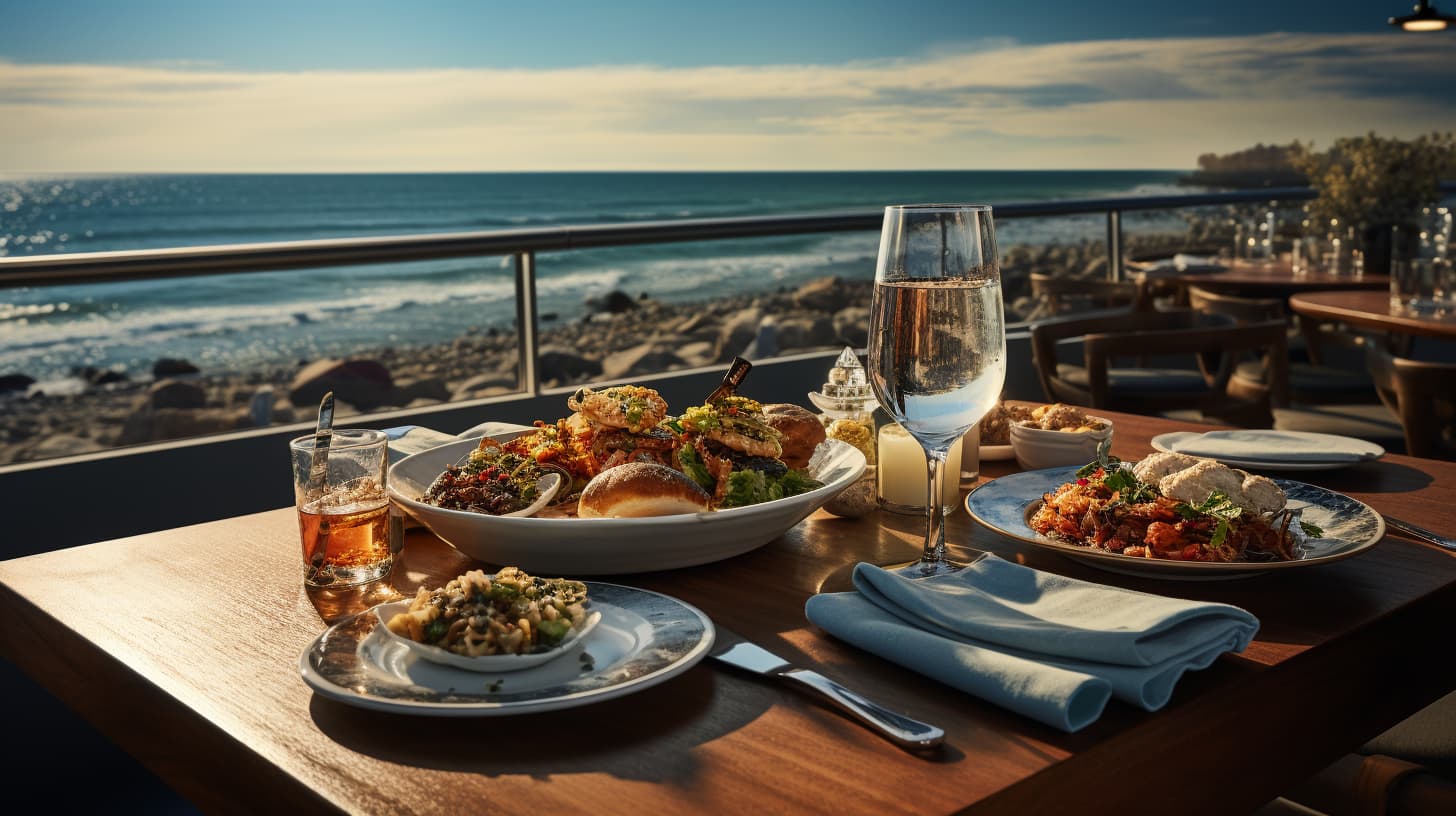The culinary landscape of Michigan, a hub of incredible diversity and creativity, is a delectable treasure left to be explored by both locals and visitors. Home to an abundance of fresh seasonal produce and a rich history of food culture, the state has become a sanctuary for gourmet food enthusiasts.
The evolution of gourmet food in Michigan is a fascinating tale, intertwining the state’s unique regional resources with the creativity of its talented local chefs. In this exploration, we delve into the history, significant contributions, unforgettable dishes, and the promising future of Michigan’s gourmet food scene.
The Evolution of Gourmet Food in Michigan
Historical Development of Gourmet Food in Michigan
The story of the evolution of gourmet food in Michigan is interwoven with the rich history and diverse culture of the Great Lakes State. The culinary journey ranges from the traditional cuisine of Native American tribes to the influx of European and Middle Eastern immigrants, and the more recent emphasis on farm-to-table freshness and regional uniqueness.
Native American groups such as the Ojibwe, Odawa, and Potawatomi tribes cultivated the initial food culture in Michigan with a diet based on fish, game, and the “Three Sisters” – corn, beans, and squash. This foundation was built upon by the French explorers and fur traders in the 17th and 18th centuries, who introduced items like pastries and stews.
The 19th century saw a huge influx of European immigrants to Michigan, each bringing along their respective culinary traditions. Germans settled in Detroit influencing the brewing industry, Italians in Macomb County introduced pasta and pizzas, Poles in Hamtramck brought kielbasa and pierogi, while the Dutch in West Michigan contributed pastries like Dutch Letters and Banket.
Major Turning Points
The major turning points in the gourmet food scene in Michigan can be traced back to the 20th century. It started with the growth of the automobile industry in Detroit, which led to increased prosperity and a demand for finer dining experiences. This sparked the establishment of high-end restaurants serving upscale versions of ethnic cuisines.
Fast forward to the late 20th and early 21st century, Michigan saw a significant shift towards locally sourced, organic ingredients, and sustainable agriculture. The best farm-to-table restaurants in Michigan practice these traits. This “farm-to-table” movement emphasized the importance of using fresh, local produce and responsibly raised meats in gourmet dining.
Influence of Regional Resources and Culture
Michigan’s diverse geography and climate have played a critical role in shaping its culinary landscape. The abundant fresh water bodies have made Michigan a prime location for fishing, thus influencing a cuisine rich in freshwater fish like whitefish and perch. It’s also become a hub for fruit production, particularly apples and cherries, influencing both sweet and savory gourmet dishes.
Culture also plays an integral role. Michigan’s large Middle Eastern population, particularly in Dearborn, has led to the rise of gourmet Lebanese and other Middle Eastern restaurants. Meanwhile, the large Hispanic community in Southwest Detroit has influenced the flavors of Mexican gourmet cuisine in the city.
Diverse and Sustainable: A Glimpse into Michigan’s Gourmet Food Scene
The gourmet food scene in Michigan is a melting pot of multicultural influences, revering local produce while nurturing sustainable practices. As culinary innovation progressively intertwines with a deeply rooted appreciation for diversity and tradition, Michigan cementes its place as a substantial hub for gourmet gastronomy.
Prominent Gourmet Chefs and Restaurants in Michigan
Michelin Honed Maestro: Meet Luciano DelSignore
A noteworthy figure in Michigan’s world of gourmet is none other than Luciano DelSignore. His gastronomic adventure commenced from simple beginnings at his family’s pizzeria in Detroit, eventually illuminating theatres of the culinary world. Following graduation from Oakland Community College’s culinary arts program, DelSignore embarked on an enlightening journey to Italy, gaining vital expertise while training at Michelin-starred restaurants such as Ristorante Marchesi in Brescia and Villa Fiordaliso on Lake Garda. His journey mirrors a symbiotic blend of relentless effort, admiration for Italian cuisine, and a heart filled with passion.
Bacco Ristorante in Southfield and Pernoi in Birmingham are living testimonials to DelSignore’s culinary genius. Bacco Ristorante, famed for its unrivalled contemporary Italian cuisine, complements Pernoi’s showcase of DelSignore’s fascination with the luxury of Mediterranean and French cuisines. Signature dishes including the succulent wild boar ragu, lamb ossobuco, and sinfully delicious tiramisu have become crowd favourites. Not to mention his staggering accomplishments as a nine-time James Beard Award semi-finalist for Best Chef: Great Lakes and numerous awards from esteemed publications such as the Detroit Free Press and Hour Detroit.
Chef Garrett Lipar: Bringing Foraged Goodness to Detroit
Garrett Lipar, a native of Livonia, Michigan, is another phenomenal talent in the state’s gourmet scene. He started his culinary journey at the Schoolcraft College in Livonia before going to Chicago to hone his skills with Iron Chef Jose Garces. But he quickly returned to his home state, bringing with him a unique style focused heavily on foraging local, often overlooked ingredients.
Lipar has gained nationwide acclaim as the executive chef of Marais, earning it a spot on the “America’s Best New Restaurants” list by Bon Appétit in 2013. Marais signified a turning point in Lipar’s career as he passionately presented Michigan’s seasonal natural bounty with an avant-garde approach. His current venture Albena, an eight-seater tasting-menu restaurant in Detroit, echoes this commitment to local and foraged ingredients. Through Albena, Lipar has carved a niche for himself with exquisite dishes like Great Lakes trout with green strawberries and grilled ramps. He was a James Beard Foundation semi-finalist for “Rising Star of the Year” in 2015 at age 26 and was nominated again for “Best Chef: Great Lakes” in 2016.
Zingerman’s Delicatessen: A Michigan Institution
Michigan is also home to some of the most iconic gourmet food destinations. One such standout is Zingerman’s Delicatessen in Ann Arbor, founded by Paul Saginaw and Ari Weinzweig in 1982. Over the years, Zingerman’s has grown into an institution, a cornucopia of deliciousness with a particular focus on traditional methods and flavors. From artisan bread and cheese to tapas, this food heaven serves a wide variety of gourmet items paired with a knowledgeable staff to guide you through the epicurean journey. It’s no wonder that Zingerman’s has been named the “coolest small company in America” by Inc. Magazine.
Chef Myles Anton: A Culinary Star in Traverse City
Up in Traverse City, Chef Myles Anton runs the kitchen at Trattoria Stella, widely considered one of the best Italian restaurants in the Midwest. Anton’s commitment to using local produce and culinary creativity assert his place in Michigan’s gourmet scene. He has earned multiple wins at the Grand Rapids’ annual ‘Grand Cochon’ competition, leading him to the national ‘Cochon 555’ competition in Aspen.
The gourmet food scene in Michigan deserves close attention as it prominently showcases the extraordinarily talented chefs and their eclectic restaurants. These culinary artists offer mouth-watering cuisines to the people of Michigan whilst also contributing significantly in elevating the culinary reputation of the state at a national level.
Famous Gourmet Dishes in Michigan
Exploring Michigan’s Gourmet Culinary Landscape
The gourmet food landscape in Michigan has evolved discernibly in recent years. The state prides itself on unique culinary offerings that echo not only with the bounty of its local produce but also underscore the creativity and innovation of its top chefs. Progressively influenced by local traditions, these culinary masterpieces have emerged as celebrated components within the wide array of food selections across the state.
Detroit-Style Pizza
One of the most renowned gourmet dishes in Michigan is Detroit-style pizza. This pizza style originated in Detroit in the 1940s. What makes the Detroit-style pizza unique is its rectangular shape, a crispy and chewy crust, and the characteristic reversal of order in which the ingredients are layered. Typically, cheese is spread directly onto the dough, followed by other toppings, and finally the sauce is ladled over the top. Some of the best places to try Detroit-style pizza include Buddy’s Pizza in Detroit and Loui’s Pizza in Hazel Park.
Traverse City Cherries
Michigan is also known for its Traverse City cherries, which are an integral part in many gourmet dishes in the state. Every July, Traverse City celebrates the National Cherry Festival where chefs across the state integrate cherries into unique and creative gastronomic wonders. From cherry pie to cherry BBQ sauce, the results are nothing short of gourmet. This gourmet ingredient can be found in many restaurants around the state, especially during the cherry season in July.
Mackinac Island Fudge
Another iconic gourmet dish from Michigan is Mackinac Island fudge. This creamy and delectable treat was first introduced to the island in the late 19th century and has since become a must-try for visitors. The fudge is made using traditional methods, with pure cane sugar, cream, and butter being the main ingredients. Ryba’s Fudge Shops, Murdick’s Fudge, and Joann’s Fudge are some of the popular fudge shops on Mackinac Island where one can enjoy these exquisite sweet treats.
Pasty: A Gourmet Dish from Michigan
The pasty is a quintessential gourmet dish hailing from the Upper Peninsula of Michigan. This meat and vegetable-filled pastry has a historical link to the Cornish miners of the 19th century, who favored this robust, portable meal. Each pasty features a hand-formed crust that encapsulates a filling of meat – typically beef – alongside rutabaga, potato, and onion. Once assembled, the pasty is then baked until golden and flakey. You can find this enticing dish in various restaurants throughout Michigan, such as Lawry’s Pasty Shop in Marquette, and Muldoon’s Pasties in Munising.
Local Ingredients Influencing Gourmet Food in Michigan
The Contribution of Michigan’s Farming Sector to Gourmet Cuisine
Understanding the full spectrum of Michigan’s gourmet food landscape is incomplete without acknowledging its diverse farming sector. As the U.S.’s second most varied agricultural state, Michigan is a plentiful producer of everything from cherries and apples, to corn and soybeans. This agricultural richness, including its emphasis on sustainable farming practices, has a direct and significant impact on the gourmet cuisine found within the state.
Farmers in Michigan commit to eco-friendly methods of production, prioritising organic and chemical-free crops to ensure quality and freshness. There are more than 47,000 farms across nearly 10 million acres of farmland. This expanse and commitment to local farming guarantee a consistent supply of high-quality ingredients to Michigan’s gourmet dining establishments.
Seasonal Specialties, Farm-to-Table Trend
The climatic variations in Michigan produce a wide range of seasonal specialties that directly influence its gourmet food scene. A scroll through Michigan’s gourmet menus in the summer will reveal various dishes made from tart cherries and blackberries, while autumn offerings highlight apples, pumpkins, and corn. Winter heralds dishes featuring stored produce like beets and potatoes while spring serves up fresh greens and asparagus. This seasonal diversity on the plate is a testament to Michigan’s expanse and agricultural abundance.
The ‘Farm-to-Table’ model is gaining traction in Michigan’s gourmet food scene. This trend emphasizes sourcing ingredients directly from local farms—thereby ensuring fresher, more nutritious meals, supporting local economies, and reducing the environmental impact. Many high-end restaurants in Michigan now maintain relationships with local farmers and explicitly reference these partnerships on their menus.
Locally Sourced Dairy and Meat
Michigan ranks high in milk production in the U.S. with its dairy farms contributing heavily to gourmet cheeses, creams, and other dairy-based delights in gourmet cuisine. Local dairy products are not only fresh but pack a unique taste due to Michigan’s distinctive terroir.
The gourmet scene also revels in its prized local meats. Michigan’s numerous livestock farms cultivate a variety of meats, from beef and pork to lamb and venison. These meats often feature prominently in Michigan gourmet restaurants, often cooked to perfection using time-honored, traditional techniques or innovative culinary approaches.
Seafood from the Great Lakes
Surrounded by the Great Lakes, Michigan has an ample supply of fresh seafood that has influenced the state’s gourmet scene. Freshly caught salmon, whitefish, perch, and more are menu regulars, often grilled, smoked, or cooked into exquisite gourmet dishes. These locally-sourced fish not only offer unique flavors but set Michigan’s gourmet food apart from landlocked states.
Michigan Wines and Beers for Pairing
Michigan’s climate is particularly suited for growing certain grape varieties. This has led to a flourishing wine industry that harmoniously pairs with the state’s gourmet dishes. Michigan’s burgeoning craft beer scene, with an emphasis on local, small-batch brewing, is also noteworthy. These locally-produced beverages are often incorporated into gourmet recipes or suggested as pairings, further enhancing the gourmet dining experience in Michigan.
Michigan takes great pride in its local ingredients, all of which significantly shape the state’s gourmet food scene. From refreshing salads, hearty mains, up until the delightfully decadent desserts, the gourmet meals in Michigan are an authentic reflection of its land or ‘terroir’, celebrating the diverse agricultural bounty and emphasizing sustainable farming practices of the state.
Future of Gourmet Food in Michigan
Michigan’s Evolving Gourmet Food Landscape
Michigan boasts an incredibly unique and rapidly expanding culinary landscape. Famous for its internationally-renowned restaurants and star chefs, the state guarantees a gourmet food experience that continues to win the hearts of many a gastronome. The famous food in Michigan has been recognized globally.
Michigan’s local food scene offers much more than just your traditional comfort food. It extends to gourmet and sophisticated dining experiences that convincingly echo global food trends. This exhibits the state’s cultural diversity and its ability to stay abreast with the evolving culinary world.
Sustainability Practices in Michigan’s Gourmet Food Landscape
A key trend shaping the future of the gourmet food scene in Michigan is the commitment to sustainability. Local restaurants and food producers are shifting towards using locally sourced and seasonal ingredients thereby reducing food miles and ensuring the freshness and integrity of their products. This movement not only promotes sustainable food production but also supports local farmers and producers.
Waste reduction is another practice restaurants are embracing, with a lot of focus being laid on compostable materials, recycling, and measures to reduce food wastage. From reducing single-use plastic items to implementing waste management and composting systems, Michigan’s gourmet food industry is making a concerted effort to minimize its environmental impact.
Technological Advancements in the Gourmet Food Scene
Food technology is playing an increasingly significant role in shaping Michigan’s gourmet food landscape. From farm-to-table networks using blockchain technology to ensure transparency in sourcing, to breakthroughs in food science creating alternative proteins and other innovative ingredients, there’s an ongoing transformation in the way food is produced, processed, and presented.
Restaurant technology is also evolving, with the adoption of digital menus, online ordering and delivery systems, and advanced kitchen appliances that enhance efficiencies and precision in food preparation.
Upcoming Talent in Gourmet Food Scene
The future of gourmet food in Michigan also rests on the shoulders of its upcoming talent. The culinary industry in Michigan has seen a surge of young, dynamic chefs and entrepreneurs launching innovative concepts and experimental dishes.
These culinary innovators are not only introducing global flavors and unique dining experiences to Michigan’s food scene, but they are also helping to drive the trends of farm-to-table, ecological responsibility, and cutting-edge gastronomy.
In conclusion, the future of gourmet food in Michigan appears promising, driven by a focus on sustainable and local sourcing, technological advancements enhancing every aspect of the industry, and an influx of new talent eager to experiment and innovate. Whether you’re a foodie resident or someone planning to visit the state, the evolving gourmet food scene in Michigan is something to look forward to.
Spurred by a glorious past, Michigan continues to pave a prosperous path forward in the culinary world, embracing cutting-edge food technologies and sustainability practices while nurturing the upcoming generation of gourmet chefs.
Michigan’s commitment to harnessing locally sourced ingredients, promoting innovation, and upholding its distinct culinary traditions serves to highlight its rich gourmet food culture. As we journey through the unfolding narrative of Michigan’s gourmet food scene, its resonance reaches beyond the tables of its esteemed restaurants, shaping regional identities and fostering a sense of community. Thus, the exciting world of gourmet food in Michigan invites us all to savor the tastes of history, culture, and innovation.






